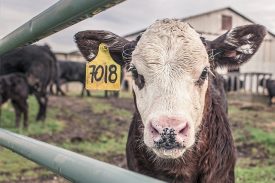Why is it so tough to cut meat?
By Tressa Arbow

When the Intergovernmental Panel on Climate Change (IPCC) released their Special Report on Global Warming of 1.5°C in late 2018, the message was clear that we need urgent changes to whole societal systems if we hope to avoid potentially irreversible warming. Scientists and decision-makers are working against the clock to reduce greenhouse gas emissions (GHGs) with initiatives that range from restoring mangroves to decarbonizing transportation. But some remain skeptical about targeting one important source of GHGs: animal agriculture and the corresponding consumption of meat.
At the 24th Conference of the Parties to the United Nations Framework Convention on Climate Change (COP24), Shefali Sharma of the Institute for Agriculture and Trade Policy reported that “The top 5 meat and dairy corporations combined emitted more emissions in 2016 than ExxonMobil, Shell or BP.” We know that animal agriculture, especially the production of beef, contributes a considerable amount of the GHGs that cause climate change. But can we reduce our meat consumption enough to make an impact? I think it’s possible, but it won’t be easy.
Take COP24. Media blasted event organizers for providing more meat and dairy options than plant-based ones, which sent a message to the public that reducing meat consumption is not a serious recommendation. After all, if leading climate advocates aren’t inspired to adjust the menu, the rest of us shouldn’t be expected to either. Another potential barrier is that some environmental NGOs have been noticeably absent from the cause. This study found that 34 NGOs in the U.S., Canada, and Sweden, were reluctant to address meat reduction because, among other reasons, it was better left to animal rights organizations or simply too personal.

Why, despite the evidence, are we reluctant to swap meat for plants? The meat industry has played a prominent role in making it more difficult. Great Depression-era farm subsidies continue to incentivize farmers to grow commodity crops like corn and soy, which are then used for livestock feed and processed foods. This system keeps meat prices low, but has also been associated with health issues and hides the environmental cost of production. The meat industry also has extensive power in American politics, historically ensuring that meat consumption is promoted and factory farm conditions are hidden. The industry has also begun to push back against plant-based alternatives, listing its concern among 2018 policy priorities. Perhaps the meat industry’s history and power have even influenced men’s association of meat with masculinity and our obsession with protein. Understandably, our food decisions feel very personal – but they are often rooted in longstanding political and economic systems.

And yet, a Gallup poll showed that U.S. sales for plant-based food and alternatives grew 8% in 2017. The same poll showed that the number of vegetarians and vegans remained mostly stagnant, though, so what accounts for the sales increase? It could be a variety of factors, including the availability of palatable alternatives. Health researchers found that taste is more important in food selection than knowledge of health benefits, so perhaps UN Champions of the Earth Award winners like Impossible Foods and Beyond Meat—which Tyson Foods has invested in—are on the way to helping us make the swap.
Or maybe the key is just knowing that we don’t have to swear off meat all together in order to do our part. In fact, the planetary diet, which was collaboratively developed by a group that included climate scientists and health professionals, suggests that we could eat a burger a week and still support a healthier climate.
Our food systems, particularly in Western countries, need to be transformed if we hope to reduce GHGs and slow climate change. Whatever the solutions may be, they will require the expertise of leaders in climate, health, and marketing; reform from public institutions and leaders; and consideration for the workers whose livelihoods will be impacted. At the individual level, those who are able can make a few dietary changes that are better for the planet, our health, and animals. Sounds like a win-win-win, if you ask me.
